(CNN) By Alaa Elassar, Protesters across Lebanon joined hands on Sunday to form a human chain that connected the country’s north and south, a symbolic display of national unity during a period of political turmoil. Nearly 170,000 people joined the chain, which ran from Akkar to Sidon, said Dr. Sally Hammoud, an event organizer. “It […]
yahoo.com — Hashem Osseiran and Anwar Amro — Beirut (AFP) – Demonstrators across Lebanon blocked roads and took to the streets Saturday for a 10th consecutive day, defying what they said were attempts by Hezbollah to defuse their movement and despite tensions with the army. The protesters — who have thronged Lebanese towns and cities since October […]
by aljazeera.com — Mersiha Gadzo – Beirut, Lebanon – Demonstrators in the Lebanese capital say their demands are “clear” and they will keep protesting until the government falls, disregarding a speech by Hezbollah’s leader who warned that the protest movement risked pushing Lebanon into “chaos” and “God forbid” civil war. In a televised address on […]
by naharnet — Scuffles renewed Thursday at Beirut’s Riad al-Solh Square between anti-government protesters and young men accusing them of “insulting” Hizbullah chief Sayyed Hassan Nasrallah. The scuffles had first erupted Wednesday evening but took a more violent turn on Thursday with the increase in the numbers of both the protesters and the “Nasrallah defenders.” […]
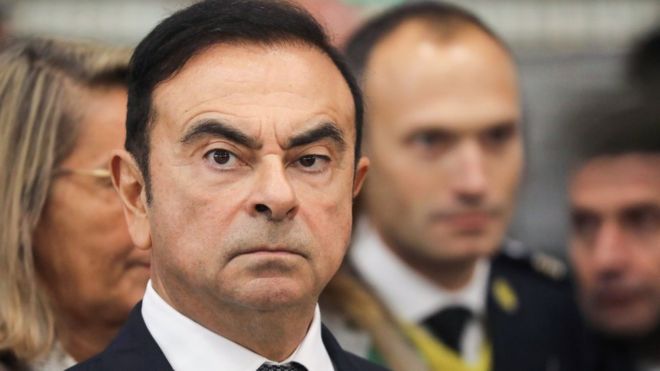
bbc.com — Mr Ghosn, who was arrested last year over claims of financial misconduct, faces several charges in Japan. His lawyers say the Tokyo court should drop all charges against him because of “unlawful breaches” by prosecutors. Mr Ghosn, formerly a towering figure in the carmaking world, is out on bail awaiting trial. Mr Ghosn’s lawyers said in a statement that the prosecutors’ case was “politically motivated” and laid out some of the “illegal actions” they say were committed by the prosecutors. “The prosecution against him resulted from unlawful collusion between the prosecutors, government officials at METI (Ministry of Economy, Trade and Industry) and executives at Nissan, who formed a secret task force to drum up allegations of wrongdoing,” the lawyers said, according to the statement.
They said the aim was to oust Mr Ghosn from his position as head of the Renault-Nissan alliance to prevent him from integrating the two companies “which would have threatened the autonomy of one of the jewels of Japanese industry under the French flag”. Mr Ghosn is credited with having turned around the fortunes of both Nissan and Renault over several years. Nissan declined to comment when contacted by the BBC. Carlos Ghosn’s lawyers certainly aren’t holding back. The man himself has already accused “backstabbing” executives at Nissan of conspiring with prosecutors to bring about his downfall.
WASHINGTON (Reuters) Humeyra Pamuk – Lebanese people are “rightfully angered” with their government over its refusal to tackle corruption and Washington supports their right to demonstrate peacefully, a senior U.S. State Department official said on Wednesday. Lebanese army soldiers confront with demonstrators in an attempt to open a blocked road during ongoing anti-government protests […]




by AFP — BEIRUT: Lebanese protesters kept the country on lockdown on Tuesday (Oct 22) as they gathered for a sixth consecutive day demanding new leaders despite the government’s adoption of an emergency economic rescue plan. Demonstrations initially sparked by a proposed tax on WhatsApp and other messaging apps have grown into an unprecedented cross-sectarian street mobilisation against the political class. Rallies have spread to all major cities and into Lebanon’s vast diaspora. The cabinet was spurred into passing wide-ranging economic reforms on Monday but the move failed to win over protesters, who now seem bent on removing the entire political elite, which they see as corrupt.
In Beirut, volunteers donned gloves and cleaned up streets after euphoric crowds partied deep into the night Monday, dancing to impromptu concerts. Among them, Hussein al-Aliya, a 35-year-old bus driver, was sweeping away rubbish after a night of protests. “If it took just three days to approve (the reforms), why haven’t they done so for the past 30 years?” he asked. “We’ve come down to the street from all religious sects to bring the whole of the state down,” said the young man from the Shiite stronghold of southern Beirut. “The lawmakers and ministers are all thieves and the governor of the central bank is covering up for them,” he said. But “there are young women and men studying in the universities who could take on jobs in parliament and government.”
‘LET THE BANKS PAY’
Among the measures announced by Prime Minister Saad Hariri on Monday were a 2020 budget meant to bring the deficit down to 0.6 per cent of GDP, no new taxes, a privatisation programme and measures to support the underprivileged. It was also to slash by half the salaries of current and former lawmakers and ministers. With schools and banks closed since last week, a couple of dozen demonstrators chanted on in front of the central bank despite Monday’s announcement. “Down with the rule of the central bank. We won’t pay the taxes. Let the banks pay them,” they intoned.
BEIRUT (Reuters) – Lebanon’s government on Monday agreed a package of long-stalled reforms to try to ease an economic crisis and defuse the biggest protests against the ruling elite in decades. Demonstrators carry national flags during an anti-government protest in Tripoli, Lebanon October 21, 2019. REUTERS/Omar Ibrahim The cabinet also approved a 2020 state budget […]
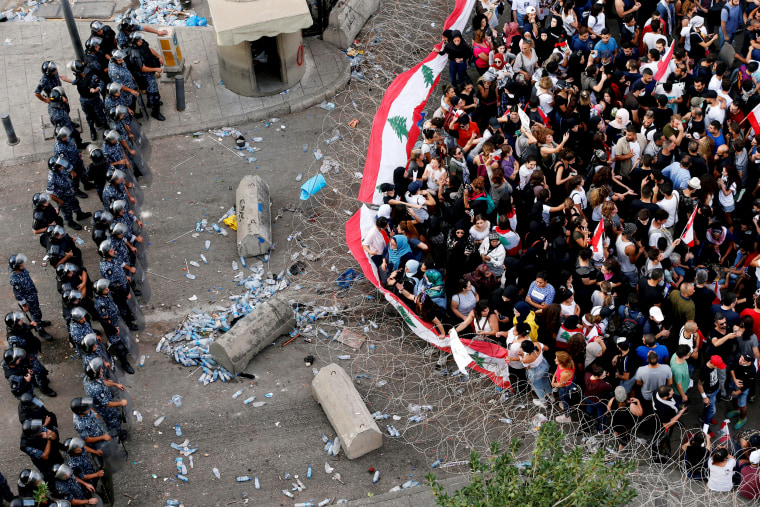
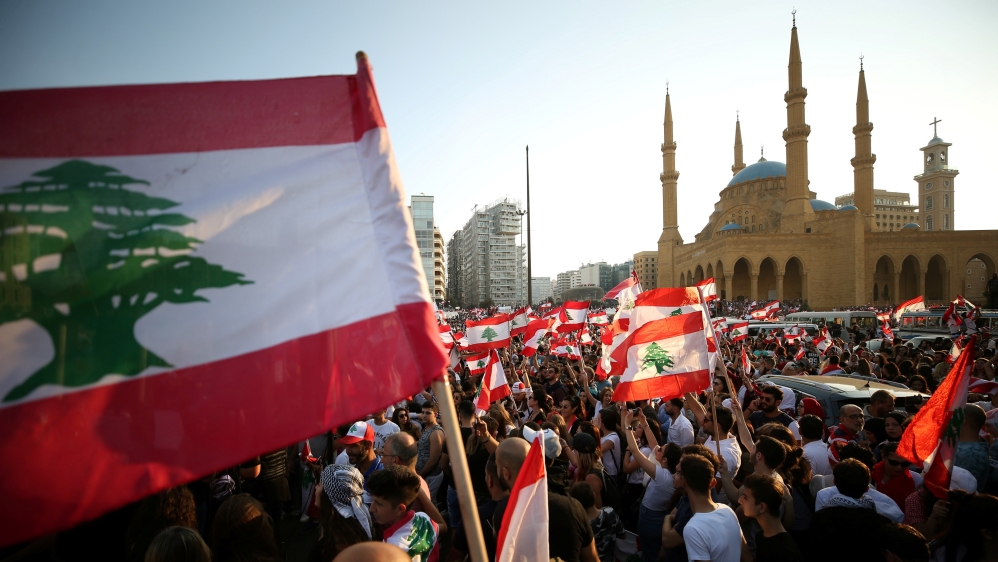
![Some claims on public space have been more symbolic [Timour Azhari/Al Jazeera]](https://www.aljazeera.com/mritems/imagecache/mbdxxlarge/mritems/Images/2019/10/20/0a923a60b5f14ce3870ac1ff0f3c613e_18.jpg)
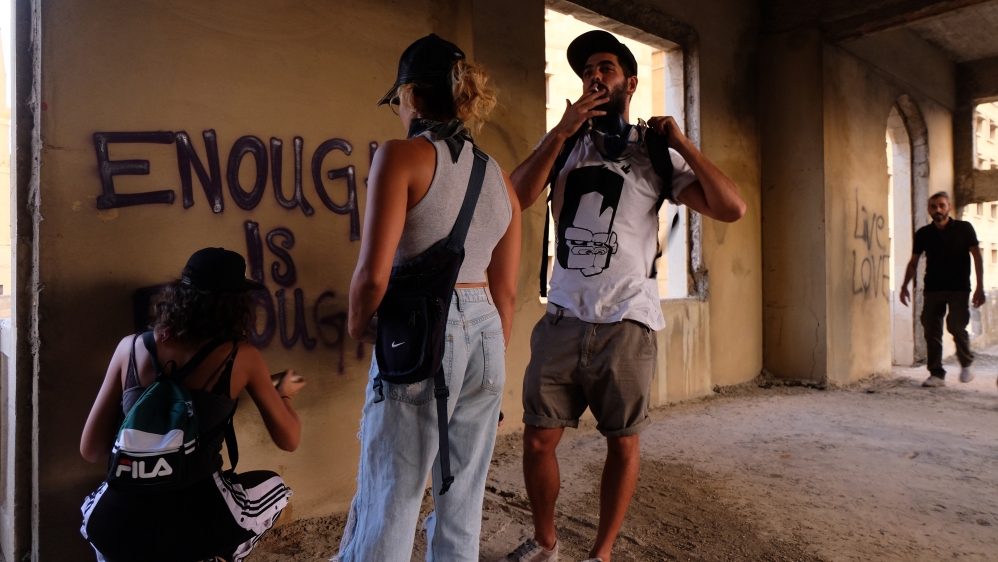
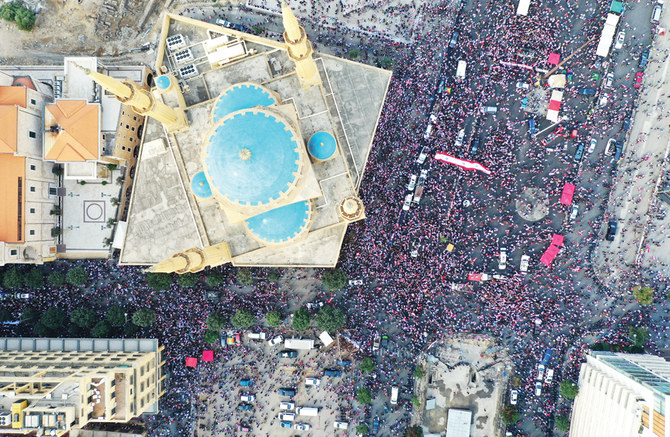

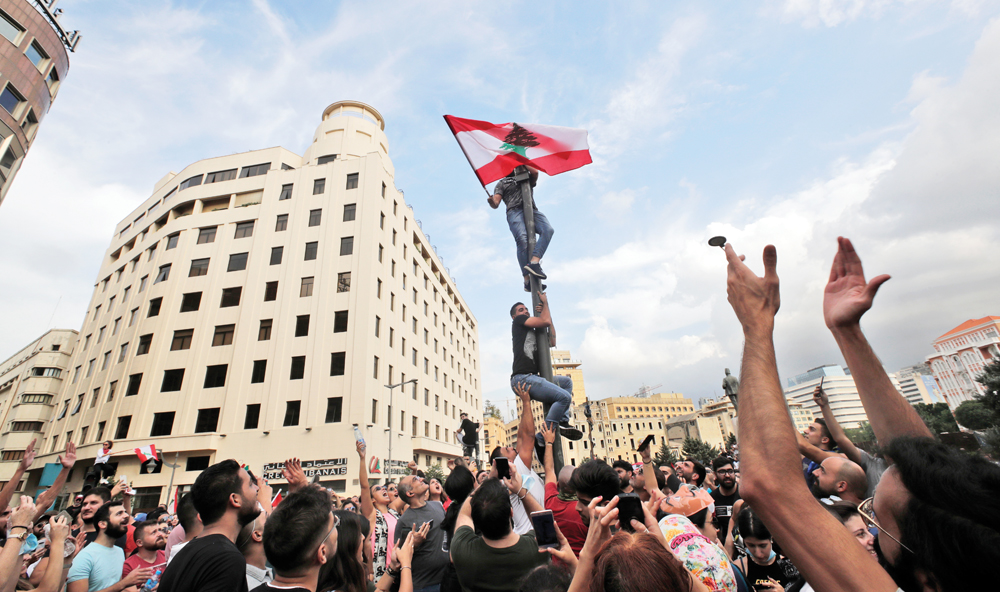
khazen.org request
By Reuters — BEIRUT — Lebanese Prime Minister Saad al-Hariri agreed on Sunday a package of reforms with government partners to ease an economic crisis that has sparked protests aimed at ousting a ruling elite seen as riddled with corruption and cronyism. Officials told Reuters the agreement was reached as hundreds of thousands of protesters flooded the streets for a fourth day in the biggest show of dissent against the establishment in decades. A sea of people, some waving Lebanese flags, called for revolution in protests that resembled the 2011 Arab revolts that toppled four presidents. Hariri, who is leading a coalition government mired by sectarian and political rivalries, gave his feuding government partners a 72-hour deadline on Friday to agree reforms that could ward off crisis, hinting he may otherwise resign. Hariri accused his rivals of obstructing his reform measures that could unlock $11 billion in Western donor pledges and help avert economic collapse.
The reform decisions require a 50 percent reduction in salaries of current and former presidents, ministers and MPs plus cuts in benefits to state institutions and officials. It also obliges the central bank and private banks to contribute $3.3 billion to achieve a “near zero deficit” for the 2020 budget. It also includes a plan to privatize the telecommunications sector and an overhaul of the costly and crumbling electricity sector, which poses one of the biggest strains on the country’s depleted finances. Government sources said Hariri’s cabinet would meet at midday on Monday at the presidential palace to approve the reform package.
The anti-government protests, fueled by crippling economic conditions and anger at perceived government corruption, have fanned out across the country since Thursday. Cheerful, buoyant and hopeful their protests would bring change, people of all ages and religions played patriotic songs and danced in the streets, with some forming human chains and chanting for their leaders to be ousted. Festival-like scenes dominated the country from the capital Beirut to remote towns, with loudspeakers blaring music as crowds kept pouring into the streets. “I am here because I am disgusted by our politicians. Nothing works. This is not a state. Salaries are very low, prices are very high. We don’t even have work these days,” said Cherine Shawa, 32, an interior architect, in Beirut. Ending rampant corruption is a central demand of the protesters, who say the country’s leaders have used their positions to enrich themselves for decades through favorable deals and kickbacks. “We’re here to say to our leaders ‘leave’. We have no hope in them but we’re hopeful that these protests will bring change,” Hanan Takkouche, in her 40s and among a group of women in the capital. “They came to fill their pockets. They’re all crooks and thieves,” she added.
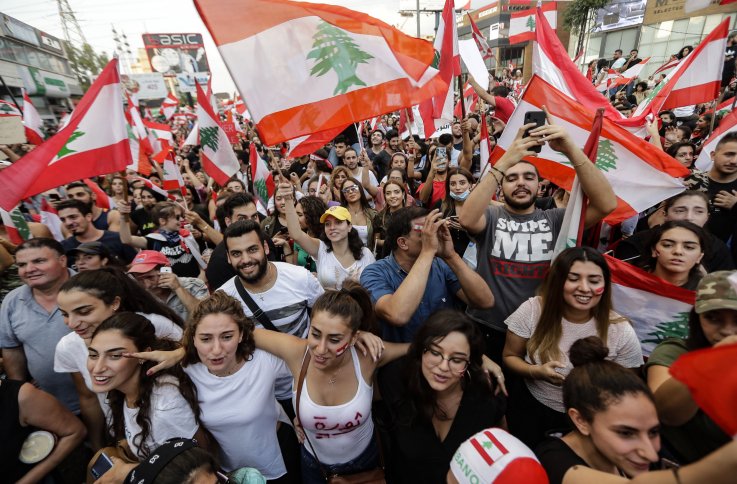
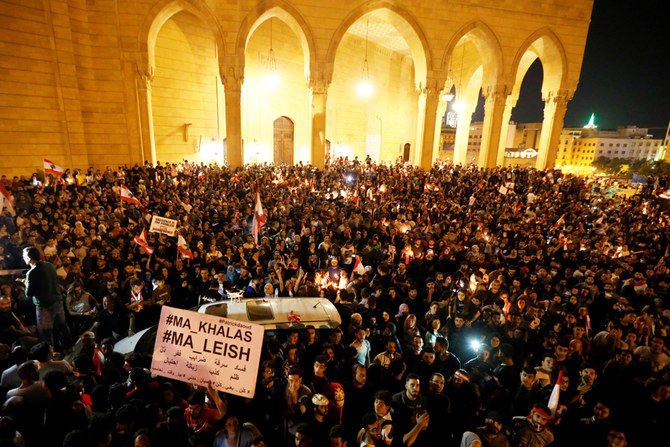

by newsweek.com – JAMES CROWLEY — Amnesty International has issued a demand to Lebanese forces that they cease the use of excessive force on peaceful protesters in Beirut. The human rights organization stated in a press release Saturday that Lebanon security forces were beating protesters, chasing them at gunpoint, and using large amounts of tear gas on crowds that had gathered in major cities to protest political corruption and call for economic and social reforms. Protests in Lebanon began in early October, with many moved to act by the country’s growing economic crisis, trash pileup, and failing power grid. Security forces began to break up protesters, after Lebanese Prime Minister Saad Hariri gave his opponents 72 hours to find a solution to the country’s economic crisis, as CNN reported. Many protesters have called for Hariri’s removal. Lynn Maalouf, Amnesty International’s Middle East research director, said in the statement: “We call on the Lebanese authorities to respect the right of protesters to freedom of peaceful assembly and investigate the excessive use of tear gas as well as the beatings and harassment at gunpoint of protesters that took place last night.”
She also remarked: “Promises by government officials to address protesters’ grievances ring terribly hollow and deceitful when security forces are given free rein to prevent the Lebanese people from voicing their anger in what was until then a largely peaceful manner.” Maalouf called the security force’s actions not just an abuse of force, but also a violation of the people’s right to a peaceful protest: “The intention was clearly to prevent protesters gathering – in a clear violation of the right to peaceful assembly.” The organization reported several accounts of violence from protesters, including stones and tear gas bombs being thrown at protesters resting in tents Another protester told Amnesty International: “Army forces followed us and they started hitting and arresting whoever they laid hands on. We were all peaceful protesters. They were hitting people on their heads and bodies with their hands, rifles and batons,” following the entrance of army vehicles to evacuate the area.
According to Amnesty International, over 60 protesters were hospitalized and 70 were arrested, despite the protest being peaceful prior to authorities’ use of excessive force. Maalouf stated that authorities must aim to “reduce tension” rather than exercise force. She also demanded an investigation into the authorities that used excessive force against the protesters. “The authorities must also signal their commitment to respecting peaceful protest by immediately and effectively investigating all report arbitrary and abusive force against protesters and allegations of ill-treatment of those arrested.”
Geagea Announces LF’s Resignation from Government
by Naharnet — The Lebanese Forces quit Lebanon’s coalition government Saturday as tens of thousands of people took to the streets for a third day of protests against tax increases and official corruption. After protesters marched in Beirut, Tripoli and other cities across Lebanon, LF leader Samir Geagea said his party’s four ministers were resigning from the government. “We are now convinced that the government is unable to take the necessary steps to save the situation,” said Geagea. “Therefore, the bloc decided to ask its ministers to resign from the government.” The protesters took to the streets despite calls for calm from politicians and dozens of arrests on Friday. Many waved billowing Lebanese flags and insisted the protests should remain peaceful and non-sectarian.



